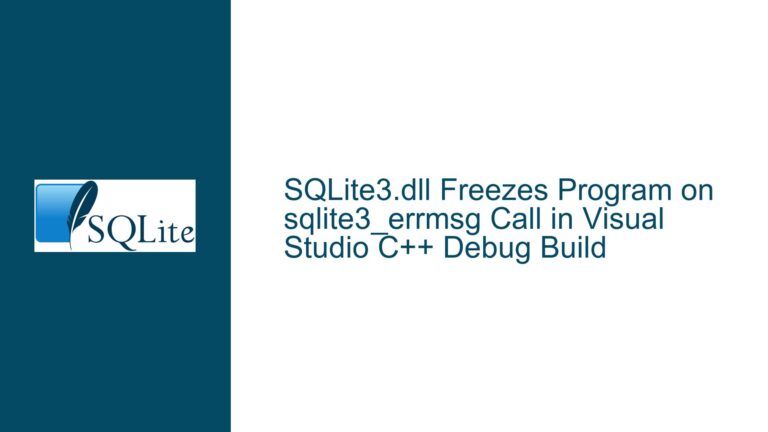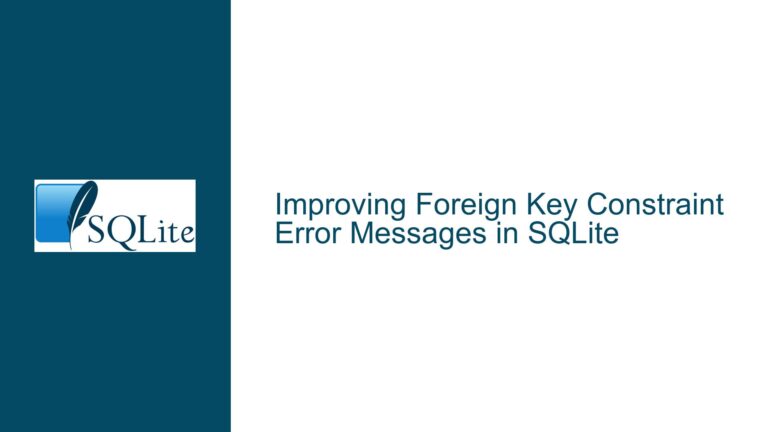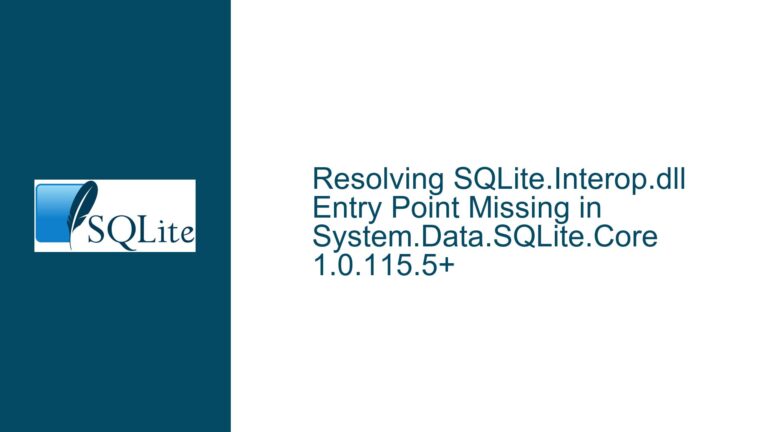Sessionfuzz Assertion Failure on ARM, PPC, and SPARC Architectures
Sessionfuzz Assertion Failure in pager_open_journal
The core issue revolves around an assertion failure in the pager_open_journal function within SQLite’s sessionfuzz utility. This failure occurs specifically on ARM, PPC, and SPARC architectures when running the sessionfuzz test. The assertion rc!=SQLITE_OK || isOpen(pPager->jfd) fails, indicating that the journal file descriptor (pPager->jfd) is not open despite the function expecting it to be. This issue is particularly problematic because it prevents the sessionfuzz utility from functioning correctly on these architectures, which are often used in embedded systems and other specialized environments.
The failure manifests during the execution of the sessionfuzz test, which is designed to validate the session extension of SQLite. The session extension allows changes to a database to be captured and later applied to another database, making it a critical component for replication and synchronization tasks. The assertion failure suggests that the journal file, which is essential for maintaining atomicity and durability in SQLite, is not being opened correctly. This could lead to data corruption or loss if not addressed.
The issue is particularly insidious because it does not occur on x86_32 or x86_64 architectures, making it difficult to diagnose without access to the affected hardware. The problem appears to be related to the interaction between SQLite’s internal mechanisms for managing journal files and the specific behavior of the GCC compiler on ARM, PPC, and SPARC architectures. The failure is triggered when the sqlite3MemJournalOpen function is inlined by the GCC optimizer, leading to incorrect assumptions about the state of the journal file descriptor.
GCC Optimizer Misinterpreting Pointer Aliasing in SQLite
The root cause of the assertion failure lies in the interaction between SQLite’s use of pointer aliasing and the GCC compiler’s optimization behavior. Pointer aliasing is a technique where multiple pointers refer to the same memory location, allowing for more efficient memory management. However, this technique can lead to undefined behavior if not handled correctly, especially when combined with aggressive compiler optimizations.
In this case, the isOpen macro, which checks whether a file descriptor is open by verifying that its pMethods pointer is non-NULL, is being misoptimized by GCC. The macro is used in an assertion to ensure that the journal file descriptor is open after calling sqlite3MemJournalOpen. However, the GCC optimizer incorrectly assumes that the value of pMethods cannot change between the call to sqlite3MemJournalOpen and the assertion check. This assumption is incorrect because sqlite3MemJournalOpen modifies the pMethods pointer, but the optimizer does not account for this change.
The problem is exacerbated by the fact that the sqlite3MemJournalOpen function is inlined by the GCC optimizer when compiling with the -O2 optimization flag. Inlining can lead to more efficient code, but in this case, it causes the optimizer to make incorrect assumptions about the state of the pMethods pointer. When the function is not inlined (either by using the -Os optimization flag or by explicitly marking the function as noinline), the problem does not occur.
This issue highlights a broader challenge in C programming: the difficulty of ensuring correct behavior in the presence of aggressive compiler optimizations. The C standard allows compilers to make assumptions about pointer aliasing that can lead to unexpected behavior, especially in complex codebases like SQLite. In this case, the SQLite codebase was inadvertently relying on behavior that is not guaranteed by the C standard, leading to the assertion failure on certain architectures.
Implementing -fno-strict-aliasing and Code Fixes
To address the assertion failure, several solutions and workarounds are available. The most straightforward workaround is to compile SQLite with the -fno-strict-aliasing flag, which disables the GCC optimizer’s strict aliasing rules. This flag prevents the optimizer from making assumptions about pointer aliasing, ensuring that the pMethods pointer is correctly updated by sqlite3MemJournalOpen. This workaround has been confirmed to resolve the issue on ARM, PPC, and SPARC architectures.
Another workaround is to use an earlier version of GCC that does not exhibit this optimization behavior. However, this approach is less practical in environments where the latest compiler versions are required for other reasons. Alternatively, changing the optimization flag from -O2 to -Os can also resolve the issue, as the -Os flag typically results in less aggressive inlining and optimization.
In addition to these workarounds, a permanent fix has been implemented in the SQLite codebase. The fix involves modifying the code to ensure that the pMethods pointer is correctly updated and that the optimizer does not make incorrect assumptions about its value. This fix has been confirmed to resolve the issue on all affected architectures, including ARM, PPC, and SPARC.
The fix involves changes to the pager_open_journal function, specifically around the handling of the pMethods pointer. The updated code ensures that the pointer is correctly updated before the assertion check, preventing the optimizer from making incorrect assumptions. This fix has been incorporated into the SQLite codebase and is available in the latest releases.
In summary, the assertion failure in sessionfuzz on ARM, PPC, and SPARC architectures is caused by a combination of SQLite’s use of pointer aliasing and the GCC optimizer’s behavior. The issue can be resolved by using the -fno-strict-aliasing flag, changing the optimization level, or applying the permanent fix in the SQLite codebase. These solutions ensure that the sessionfuzz utility functions correctly on all architectures, maintaining the reliability and robustness of SQLite’s session extension.






